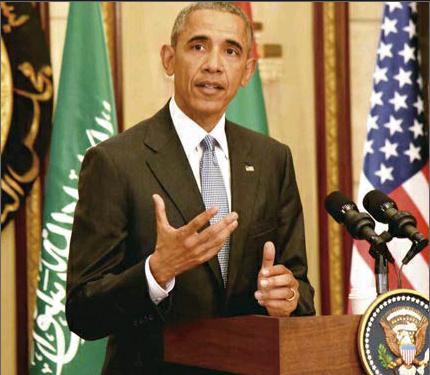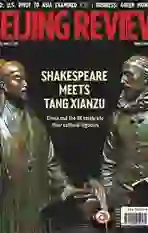A Pivotal Moment
2016-06-08ByHichemKaroui
By+Hichem+Karoui


The cornerstone and legacy of U.S. President Barack Obamas foreign policy was embodied through the declaration of a “pivot” to Asia five years ago.
In a speech addressing the Australian Parliament on November 17, 2011, he said, “Here, we see the future… As a Pacific nation, the United States will play a larger and long-term role in shaping this region and its future, by upholding core principles and in close partnership with our allies and friends.”
Less than two months later, at the beginning of January 2012, a new Defense Strategic Guidance plan emphasized a strategic geographical “shift of priorities to East Asia and the Pacific, while maintaining current interest in the Middle East.”
Middle East anxiety
It didnt take long for leaders in the Middle East to connect the dots and conclude that the shift had ominous connotations. It meant that the United States would retreat from or at least reduce the extent of its commitment to the defense and security of its traditional Arab allies at a moment when its support was needed the most.
In February 2015, leaders from Gulf Cooperation Council (GCC) member states found a basis for their concerns in the new U.S. National Security Strategy (NSS). While taking a tougher line with both China and Russia, this document emphasized the United States desire for collaboration with the two nations. Even so, what raised eyebrows was that for the first time, the strategy classified its objectives by geographic region and listed what it termed a “rebalance” toward Asia and the Pacific as the first topic for discussion.
The relationships which have bound some Arab Gulf states to the United States for long periods—such as Saudi Arabia, which became a U.S. ally after World War II(WWII)—have been undergoing the most grueling test since the infamous terrorist attacks on the United States on September 11, 2001.
Hitherto, these relationships had lasted through peace and weathered turbulent times of war. Prevalent among the instances of hardship were the anti-Soviet war in Afghanistan in the 1980s, the Iran-Iraq war in 1980-88, the liberation of Kuwait in 1990-91, and the 9/11 terrorist attacks. Most recently, the United States has played a hand in unleashing “dark forces”in the Middle East through their invasions of Afghanistan and Iraq. The ongoing war on terror has not only provided a breeding ground for Islamic extremism, but also fostered factionalism and sectarianism based on the Shia-Sunni conflict, tribalism, and even anti-Americanism.
Divergent assessments
Americans and Arabs did not share the same assessment of their alliance beyond their evaluation of the regional and international priorities and challenges. Arab leaders—especially those in the GCC—viewed the U.S. strategic shift toward the Asia-Pacific region as the superpowers first step in its retreat from its role as their main security guarantor.
They did not have to look far to reach such a conclusion. In 1971, Great Britain was no longer able to provide security and defense for the Arab Gulf region. While this withdrawal opened the way for the independence of the countries which compose the GCC, it also placed the United States as their new guarantor. The rich but fragile sheikdoms in the GCC have since been wary of larger regional powers such as Iraq and Iran, and have remained suspicious of Russias plans for the Middle East region.
The dilemma is ambiguous to Arab analysts, diplomats, and leaders. They are undecided on whether the pivot expresses a genuine interest in the Asia-Pacific region or outlines Americas waning power and inability to be involved in Middle Eastern issues.
For the first time in history, a single nation—the United States—became the worlds preeminent power after the Soviet Unions implosion during 1989-90 and the fall of the so-called Eastern bloc. The NSS released in 1992 during George W. Bushs tenure asserted the countrys swelling momentum—the crux of the matter was how to extend it. To do so, the United States needed to maintain its supremacy in terms of the global economy, finance, technology, military issues and industry. Consequently, energy became essential to fuel those sectors growth.
But the energy that the United States requires is in the Middle East, not in Asia. Moreover, Americas competitors, such as China and Russia, are also dependent on energy and are vying for growth. Why should the United States leave a vacuum that could be filled by its rivals when its place in Asia has already been secured by formal and informal agreements, military bases, and vested interests established after WWII? That question was recently raised by John Duke Anthony, Founding President and CEO of the National Council on U.S.-Arab Relations.
Waxing or waning?
The combined member-states of the GCC hold an estimated 30 percent of the worlds proved crude oil reserves and about 20 percent of the worlds proved natural gas reserves. The cost of producing oil in the GCC region is incomparably lower than the costs incurred from tapping into U.S. shale and non-shale reserves. Furthermore, the fall in oil prices doesnt affect the GCC region as much as it affects the American oil industry, since the GCCs long-term per-unit production levels are much greater than those of its U.S. counterparts.
So, why does the United States distance itself from its traditional allies who have allowed it to profit for decades?
At the same time, the GCCs member states have never needed the support of the United States as much as they do now. The United States change in foreign policy could not have come at a worse time.
A report recently issued by the Valdai Club in Moscow noted: “What we have now is a Hobbesian moment—not only (one might even say ‘not so much) a growing number of increasingly varied conflicts and wars, but specifically, the inability of the leading players to agree on rules for interaction.” It is not just Moscow or the Arab world that considers the so-called “Islamic State” group as a threat to civilization, increasing numbers of people across the globe also take the same view.
In an article in The Atlantic in March, Jeffrey Goldberg claimed that when Obama looks at large parts of the Middle East, he sees Hobbes “war of all against all.” In the article, Obama told Goldberg that, “I have recognition that us serving as the Leviathan clamps down and tames some of these impulses,” he said of the current regional situation. “The Middle East being exhibit A, the default position for a lot of folks is to organize tightly in the tribe and to push back or strike out against those who are different. A group like ISIS (the “Islamic State” group) is the distillation of every worst impulse along these lines.”
Many observers and Middle East analysts have started talking about a “post-SykesPicot order,” in reference to what they deem to be a failed attempt to build nation states along fractured lines and over arbitrarily defined territories. The problem is that a “new order”is still missing. Entire countries have been upended and their populations decimated, but new maps have yet to appear. The time for the rebirth of a “new Middle East” has not yet come, leaving us to deal with anarchy.
Many reasons have been suggested to explain why the United States chose this time to move its focus toward Asia. The two most significant of which are the rise of China and Israels interests.
Testing China
Anthony suggested that, since the Gulf and the Middle East are saturated with U.S. weaponry,“the logic of those whose livelihoods are dependent upon this sector” is to push the militaryindustrial complex toward another region—Asia-Pacific. The unspoken assumption is that the United States needs to make potential conflicts profitable.
At the same time, the United States takes advantage of the situation in the South China Sea to sell weapons and equipment to those who think they need to be armed. On the other hand, the rebalance also serves as a way of testing China strategically.
Anthony—who also serves on the U.S. Department of State Advisory Committee on International Economic Policy—sees Israel as being behind this plan. Lets conclude with two questions he raised in regard to this topic.
“To what extent, if any, is Israel and its American supporters strategy of deflecting negative international focus from the Jewish state eastward… with Chinas strategic analysts as a result having reason to believe that they are being encircled by an American-centric alliance... at play here?”
Finally, “Is it not in Israels strategic interests to hype the global strategic importance of the Indian Ocean—one of the worlds main maritime routes to and from the Asia-Pacific region—and, in doing so, to downplay the importance of Arabia, the Gulf, and the GCC region?”
